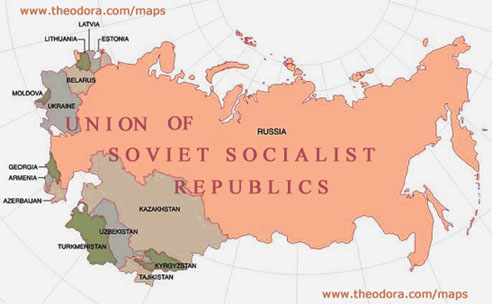Building on the concept that unions must be voluntary and that there must be internal unity before an external union can be successful, we can look at examples in certain nations. Remember the old Soviet Union? The official name was the Union of Soviet Socialist Republics—one of the most dishonest names imaginable.
First, it wasn’t a true republic—that would have required representation and the protection of inalienable rights, ideas foreign to its government. Neither was it a true union as understood by this principle. Look at the map below:
Notice all the appendages to the Soviet Union—places such as Kazakhstan, Uzbekistan, Armenia, Georgia, Lithuania, Latvia, and Estonia. None of them were eager to join this “union.” They were forced into it; voluntary consent was not an option.
This union held together for about 70 years, but when the central government could no longer keep it in line militarily, most of those appendages broke away and became independent nations. The reason? There never was any real unity.
The United States, on the other hand, provides a different image at its founding. Unique for its time [and pretty much ever since], the United States came together voluntarily, based on common agreement on basic principles. We had a consensus on the essentials: a Christian framework for understanding the nature of man; the need for a representative government that divided powers to protect from tyranny; the belief in inalienable rights granted to man by God.
It has been a model much imitated, but rarely with the same Biblical foundation. The Founders, despite their disagreements on specifics, were united on the general principles. They could hold a convention, write a Constitution, debate it in all the states, and voluntarily set up a new government. They accomplished all this because of their common worldview.
What would happen if we tried to hold a constitutional convention today? What consensus do we have now? How have we changed as a people? Would there be any hope for agreement? I submit that we are polarized as a society, one segment retaining the original Biblical framework, another rejecting it totally, and the mass of citizens in the middle, not really knowing what they believe.
We can wring our hands over this situation or . . . we can see it as an opportunity to speak Biblical truth into our society. I choose the latter.

